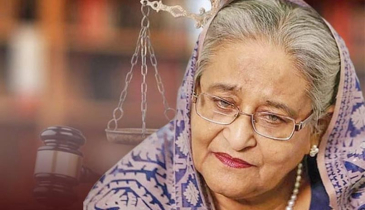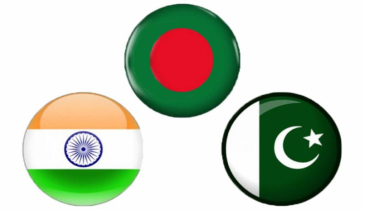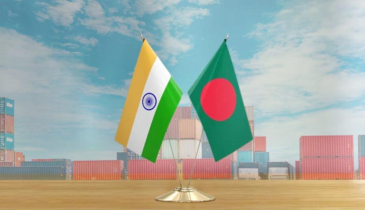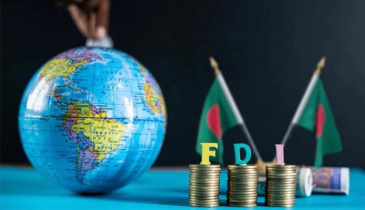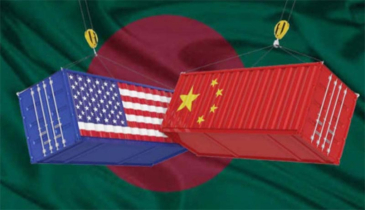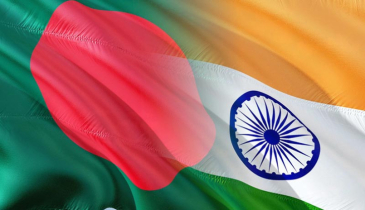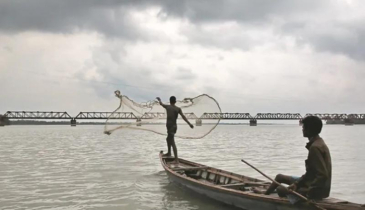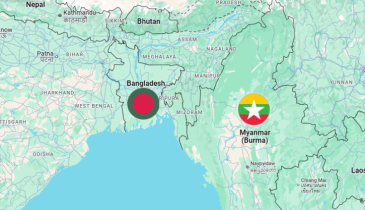Addressing the Arakan Army
Bangladesh Should Focus On Myanmar's New Reality
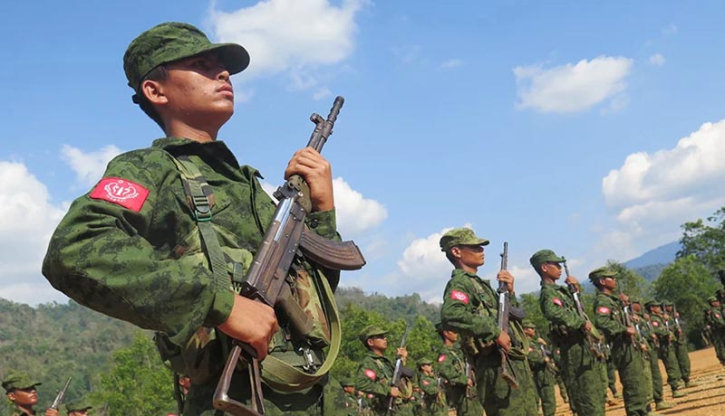
It is an irony of fate that the Myanmar Army, which was involved in expelling the Rohingyas to Bangladesh, is now counting their regime’s expulsion from the country itself as various rebel groups across Myanmar have united to counter the junta. In recent times, waves of autocratic overthrows have been seen in countries including Bangladesh and Syria, and now the question arises; could Myanmar follow suit? Meanwhile, the Arakan Army has gained significant momentum in Rakhine State, having ousted the junta from the state, except for its capital, Sittwe.
Undoubtedly, the Arakan Army has become an undeniable force in Myanmar’s new reality, since the rebel group now controls the 270-kilometer land border between Bangladesh and Myanmar. Consequently, Bangladesh cannot disregard the potential for correspondence and dialogue with the Arakan Army if needed.
In Ukhia and Teknaf of Bangladesh, nearly 1.25 million Rohingyas are currently registered in 33 refugee camps. Over the past years, Bangladesh has been unable to repatriate even a single Rohingya to Myanmar. After the fall of Maungdaw, it has become a significant concern for Bangladesh whether the Arakan Army would facilitate Rohingya refugee repatriation or push even more refugees into their neighboring countries. This remains a matter of grave concern since the Arakan Army also holds notorious records for hostility toward Rohingya Muslim community.
Next Move from Arakan Army
Having a militia of 30 to 40 thousand troops and controlling almost the entire Rakhaine state, the Arakan Army has gained significant leverage in negotiations with potential partners. The AA has also arrested several Junta top Junta officials and is determined to drive the Junta forces out of the country’s capital. Having a coalition with other rebel groups like Chin National Army (CNA), they have formed a broader alliance with various Ethnic Armed Organizations (EAOs). Drawing parallels to the situation in Syria, where rebel coalitions have been successful to drive the former autocrat Bashar Al Assad out of the nation’s capital, the rebels in Myanmar seek hope of doing the same.
China undeniably is the most predominant actor here, playing significant role in this geopolitical scenario. Its economic, historical, and strategic influence provides the country with leverage over Myanmar than its regional and global counterparts like India and USA. As a result, the Arakan Army is expected to support Chinese-led initiatives, such as the deep-sea port project in Kyaukphyu, which will facilitate the passage of oil and gas to Kunming, China, rather than backing India’s Kaladan project.
For Bangladesh, the situation is crucial. The Arakan Army’s stance must be clear with friendly relations at its western border. The group now controls most of the trade between Rakhine and Bangladesh, creating uncertainties for future export-import of Bangladesh and Myanmar. Key imports from Myanmar to Bangladesh, including onions, garlic, ginger, fish, and dried fish would be disrupted if the Arakan Army does not play rational. On top of that, Bangladesh seeks restoration of navigation through the Naf River which is vital for the economy of its southernmost region. Bangladesh should take a proactive approach to establish some sort of communication with the Arakan Army to secure its territorial and economic interests as well as the Rohingya refugee crisis in the face of ongoing instability.
Arakan Army’s Credibility to International Actors
There have been allegations of genocide and ethnic cleansing of Rohingya Muslim Communities in Myanmar’s Rakhine state. In the past, the Myanmar Army as well as the Buddhist mob’s campaign of murder, torture, arson, and mass rape has been found out. At present, the Arakan Army (AA) is now facing similar accusations, as they are still persecuting the Rohingya people and expelling them from their homelands. Sources say that the Arakan Army is deliberately burning the remaining Rohingya villages and wards in Maungdaw Township. 28 Rohingya organizations have also called out to the AA to uphold and respect Rohingya rights after its taking control over Maungdaw and Buthidaung.
The Arakan Army has to ensure that the Rohingyas in Myanmar must find peace, and justice and can live in prosperity. Otherwise, the persecution of the Rohingya people by the Arakan Army will undermine the AA’s credibility with international actors, complicating efforts to negotiate significant state matters.
On December 19, 2024 representatives from six nations—Bangladesh, China, India, Laos, Thailand, and Myanmar—met in Bangkok to discuss the situation in Myanmar. The Myanmar Junta representatives were also present at the talks.
However, it is more likely that future international forums regarding Myanmar may see representatives from the rebels, who now grab substantial power. In such cases, the Arakan Army and other Ethnic Armed Organizations (EAOs) must adopt a diplomatic approach, especially regarding dealing with minorities and safeguarding basic human rights. Failure to do so can lead to further hindrances to national power.
The Arakan Army also should prioritize the safe repatriation of the Rohingya people to their homeland and ensure a secure and inclusive environment within its controlled territories. This is essential if they are to create a leadership that sincerely represents all communities under their jurisdiction.
Foreign country role & communication with the Arakan Army
The ongoing developments in Myanmar have drawn significant interest from global powers, each with its strategic objectives. Although China, the USA, India, and Bangladesh all play key roles in the conflict, China has an upper hand in the situation.
China’s Interests in Myanmar
China’s involvement in Myanmar is driven by economic, geopolitical, and security interests. The Belt and Road Initiative (BRI), particularly through projects like the Kyaukphyu Deep Sea Port and the China-Myanmar Economic Corridor (CMEC), enhances China’s access to Indian Ocean bypassing Malacca Strait, giving China an advantage over India. China’s influence over Myanmar’s rebels also helps to counterbalance Western powers and maintain its dominance in its southern border. However, its relationships with both Myanmar’s military junta and ethnic armed groups are complicated, as both the belligerents in Myanmar are supported by Chinese authority.
Bangladesh sees this as an opportunity to engage with Myanmar’s different stakeholders, as gaining Chinese support will lead Bangladesh to do so. Beijing’s influence in Myanmar is crucial, but Bangladesh must seek assistance from China, particularly to solve the Rohingya repatriation issue, as China holds significant sway over both the junta and the rebels.
US and India’s Interests in Myanmar
The United States, often supported Myanmar’s rebels as well as pro-democracy factions, but struggled to counter China’s dominance in the region. In contrast, India faces a grave concern with Arakan Army’s control over Rakhaine. Critical projects like the Kaladan Multi-Modal Transit Transport Project (KMTTP), which links India with its Southeast part, can go to a halt because of Chinese reluctance.
Bangladesh’s Position
Alongside Bangladesh’s primary concern over Rohingya refugee repatriation, Bangladesh must be proactive in the decision-making and peace-building process amidst the recent developments in Rakhine. Traditionally, Bangladesh does not engage with any non-state insurgency groups, instead, it maintains ties with the government of the day. Moreover, the Myanmar rebels provide training and shelter to the Chittagong Hill Tracts (CHT) region-based insurgency groups. AA’s other actions, including attacks on Rohingya villages, complicate Bangladesh’s position. The Kuki-Chin National Front (KNF) which receives shelter, training, logistics, and other support from the Chin National Army (CNA) and other EAOs of Myanmar turned to grave concern for Bangladesh’s integrity. As a result, Bangladesh can not deny the stake of these entities.
A feasible approach for Bangladesh is to maintain Track II diplomacy with the rebel groups, enabling the government to render its message regarding the potential repatriation of Rohingyas, as if the groups become a political force in the national government of Myanmar, should engage with Bangladesh.
The Arakan Army’s controlling border and taking over most of Arakan is now a reality that demands some sort of communication with them. A communication with the AA could also safeguard the remaining Rohingyas who are allegedly facing persecution at the hands of the Arakan Army at present. Ending on an important note, Bangladesh must balance its engagement with Myanmar’s military as well as ethnic groups, especially given China’s influence over both sides. -Source: eurasia review
.png)


